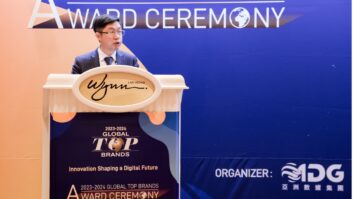In a career or your personal life, one usually admires, and respects, talent. All of us love being associated with nice, likeable people.
Rarely does the personality of an executive running a top international company feature talent and being a nice guy … except in this case — Brad Anderson.
Anderson, 59, vice chairman/CEO of Best Buy, surprised plenty in the industry today saying he will retire in June. Brian Dunn, a Best Buy veteran, has become CEO.
Yet, if you had the pleasure of meeting Brad and really listened to what he has had to say over the years, it really isn’t a surprise at all.
Anderson never planned to be a corporate type, much less the CEO of the largest consumer electronics retailer in the U.S. He joined the Sound of Music, the precursor of Best Buy, 30 years ago as a stereo salesman.
He told his story — along with another person who started out as a journalist and became a major executive in this business, Sony chairman/CEO Sir Howard Stringer — on a PBS program called “CEO Exchange” a couple of years ago. (Click here.)
Anderson admitted he wasn’t the greatest floor salesman, but he loved the products. He tried to quit, but his boss stopped him. Founder Dick Schulze visited the store one day and called him out to the parking lot. “I thought he was going to fire me,” Anderson said on that PBS show.
Instead, Schulze asked him to be the new manager of the store. Anderson surprised himself and said yes, and the rest is CE retailing history.
Anderson became only the second CEO in Best Buy’s history and is credited for doubling revenue in the seven years he has held the post, increasing the chain from 600 locations to nearly 3,900 stores, investing in the Geek Squad and Magnolia HiFi, and coming up with Best Buy’s customer centricity strategy in 2004.
So-called experts — well, like yours truly — thought would be too expensive to run.
Anderson, of course, loves consumer electronics products which is the key. But unlike some executives, especially in the case of consumer centricity, he was willing to go outside the CE industry to come up with a way to help Best Buy build on its success and sustain growth.
He would travel to different Best Buy locations to see how store managers and associates were doing. Anderson helped train many of the top executives at Best Buy and by all accounts has inspired and led by example.
I agree with Adam Levin of Levin Consulting who said today in our Talkback section: “Brad never worried about glory for himself, and made sure that others received the credit (and the pay, as he often gave up options so that others could receive the added monetary reward).”
Anderson exits at a time of great economic turmoil and changes in the CE industry, none bigger than the closing of Best Buy’s longtime rival, Circuit City. Due to the economy, Best Buy has begun to offer headquarters personnel voluntary buyouts to trim costs.
Typical of Brad, when I asked him about Circuit City last fall at the industry’s annual Anti-Defamation League dinner, he said the last thing he wanted was for Circuit City to go out of business, because “it would be bad for the industry.”
Also typical of him was Anderson’s statement today about why he was retiring, aside from spending more time with his family. “I’ve always wanted to leave the organization at the right interlude, when I saw a new leader ready to take the organization to a new level, higher than I could take it myself. Based on his readiness and the journey we’re about to begin, I’ve concluded that this is the right time for my story as CEO naturally to end, and Brian’s story to begin.”
So Brad Anderson retires on top, which proves again how wrong the old baseball manager Leo Durocher was when he said, “Nice guys finish last.”
Brad, best wishes on your retirement from your friends in the industry and at TWICE.













